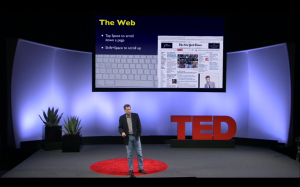 The Internet makes it possible for people to collaborate on a massive scale, working together to accomplish tasks that might otherwise be impossible. The world of online collaboration is changing rapidly—and changing our lives in the process. Many TED talks and NPR podcasts have helped us to understand the applications and implications of collaborative technology. In this fascinating radio program, TED and NPR collaborate to explore collaboration by combining excerpts from several TED talks with interviews and commentary.
The Internet makes it possible for people to collaborate on a massive scale, working together to accomplish tasks that might otherwise be impossible. The world of online collaboration is changing rapidly—and changing our lives in the process. Many TED talks and NPR podcasts have helped us to understand the applications and implications of collaborative technology. In this fascinating radio program, TED and NPR collaborate to explore collaboration by combining excerpts from several TED talks with interviews and commentary.
www.npr.org/2013/07/13/197986218/why-we-collaborate
Category: 9.2 Inside the Web
 David Pogue is one of the most prolific–and entertaining–tech writers we know. In this short TED talk, he runs through a list of tips that can save you time every day. Don’t miss it.
David Pogue is one of the most prolific–and entertaining–tech writers we know. In this short TED talk, he runs through a list of tips that can save you time every day. Don’t miss it.
Cyber-scammers are always looking for new ways to get you to reveal valuable personal information. Can you tell the difference between legitimate requests and cyber scams? Take this short quiz to find out. The quiz is a promotion for OpenDNS, a security company, but it’s worth your time even if you’re not shopping for protection. If you’re not able to identify all of the fake sites in the quiz, the feedback page will show you the clues that you missed so you can be more scam-savvy in the future.
opendns.com/phishing-quiz
http://www.ted.com/talks/gary_kovacs_tracking_the_trackers.html
If you think you’re covering your tracks as you explore the web, think again. This TED talk shows how we’re being tracked and suggests what we might need to do about it.
http://www.npr.org/2012/05/31/153701673/the-internet-a-series-of-tubes-and-then-some
The Internet isn’t just a software cloud. Andrew Blum’s book, Tubes: A Journey to the Center of the Internet, reveals the nuts and bolts of the physical Internet. In this Fresh Air interview, he talks about the hardware network that makes our Internet experience possible.
Google has been getting plenty of of publicity lately because of major changes in its privacy policy. These two articles, one from Huffington Post and one from Consumer Reports, explain how these changes affect you and what you can do about them.
http://www.huffingtonpost.com/2012/02/29/google-privacy-policy-changes_n_1310506.html
http://news.consumerreports.org/electronics/2012/03/google-launches-its-new-privacy-policy-today.html
In this five-minute TED talk, Ian Ritchie gives one of the best short answers to this question we’ve seen. At the same time, he confesses to making a multi-million dollar misjudgment. Fascinating and fun.
[ted id=1244]
Wrist communicators were popular in science fiction and comic strips decades ago. Are they going to take off in the real world soon? This Fast Company article speculates about what might happen when a wrist watch connects to a smart phone. Is this the next small thing?
CloudCanvas is a surprisingly powerful graphics programs in the form of a Facebook app. Like Photoshop, CloudCanvas contains both bitmap and vector graphics tools.
Unlike most web apps, Cloud Canvas is built entirely with HTML 5 technology that requires no special browser plugins to use.
apps.facebook.com/cloudcanvas
Many of the greatest works of art are inaccessible to most of the world’s population. In this short TED talk, Google’s Amid Sood demonstrates Art Project, a multimedia web gateway to many of world’s foremost art museums and the treasures they hold.
[ted id=1144]